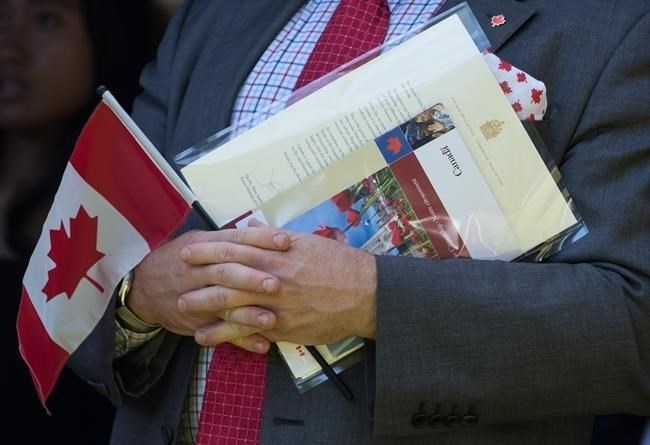
FILE PHOTO - A new Canadian holds a Canadian flag, their citizenship certificate and a letter signed by Prime Minister Justin Trudeau as they sing O Canada after becoming a Canadian citizen, during a special Canada Day citizenship ceremony in West Vancouver on Monday, July 1, 2019.
Image Credit: THE CANADIAN PRESS/Darryl Dyck
June 28, 2023 - 9:00 PM
OTTAWA - Canadians' hearts may be brimming with pride as Canada Day approaches, but a new poll suggests their minds aren't full of the knowledge needed to pass a citizenship test.
In a survey of 1,512Canadian adults, Leger found that only 23 per cent would pass the citizenship test, based on their answers to 10 randomly selected questions.
People who wish to become Canadian need to answer 20 questions about citizens' rights and responsibilities, as well as Canada's history, geography, economy, government, laws and symbols.
They need to score at least 75 per cent to pass, but the average score of the Canadians who were surveyed was only 49 per cent.
The questions focused on things like famous Canadians (Who is John Buchan?), history (Who established the first European settlements in Canada?) and national symbols (Whose portrait is on the Canadian $10 bill?).
The correct answers, for those struggling along with most survey respondents, are: a popular governor general, the French and Viola Desmond.
History questions seemed to trip up respondents the most: For example, only 24 per cent knew that the House of Commons recognized in 2006 that the Québécois form a nation within a united Canada.
Only 29 per cent knew the Constitutional Act granted legislative assemblies elected by the people, and only 41 per cent knew that English settlement began in 1610.
They fared slightly better when it came to national symbols and influential people: 49 per cent knew that Marjorie Turner-Bailey is an Olympian and descendant of black loyalists, and 42 per cent recognized Canada's motto, "From sea to sea."
Most Canadians were also in-the-know about the main groups of Indigenous Peoples in the country, with 79 per cent correctly identifying First Nations, Métis and Inuit.
People in Western Canada scored slightly better than their East Coast counterparts, with average scores in Saskatchewan, Manitoba and British Columbia at 50 per cent.
Those in Atlantic Canada scored the lowest, with a 44 per cent on average.
When the results were broken down by political affiliations, People's Party of Canada supporters had the lowest average score at 47 per cent, while people who vote for the Bloc Québécois scored the highest, at 51 per cent.
There was one question most people seemed to have no problem answering: 81 per cent said they were proud to be Canadian.
The poll cannot be assigned a margin of error because online surveys are not considered truly random samples.
This report by The Canadian Press was first published June 28, 2023.
News from © The Canadian Press, 2023